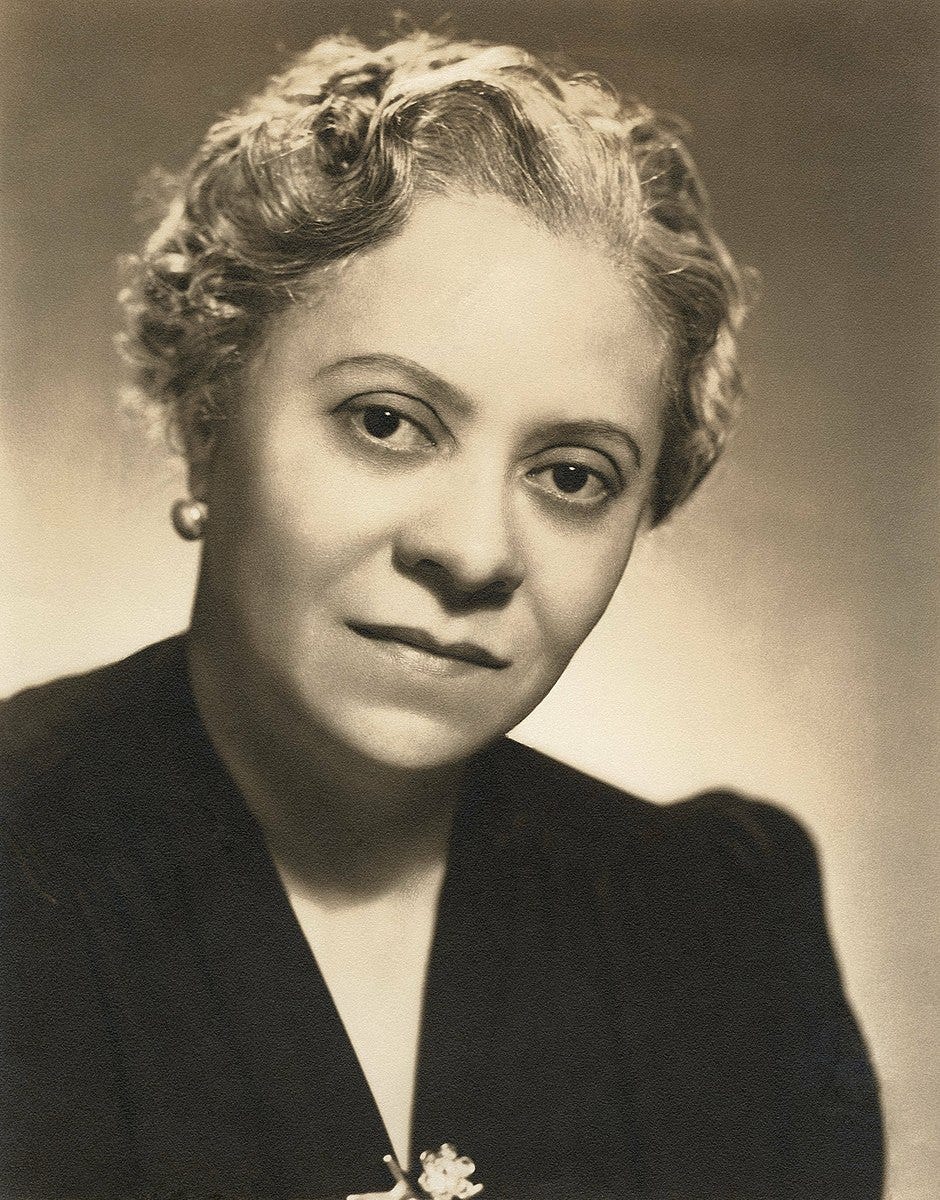With both the Supreme Court’s decision gutting affirmative action and July 4th in mind, we are having to ask ourselves as a nation, once again, for what do we stand? Trying, always trying, to be “the land of the free and the home of the brave,” how do we contend with the injustices of our history? How do we struggle with the absence of fairness?
Into this contentiousness we seek a relevant addition to our “A Reason To Smile” feature at Steady. And we have decided to share the story — and some of the music — of a uniquely American artistic voice: Florence B. Price. If you haven’t heard the name, even if you are a fan of American or classical music, you can be excused. For too long she has been overlooked in the canon, but that is thankfully starting to change.
Price was born in Little Rock, Arkansas, on April 9, 1887; her father was the only Black dentist in town, and her mother was a music teacher. Price was by many accounts a musical prodigy, serving as her high school’s valedictorian at age 14 and graduating with degrees in organ and piano at the New England Conservatory of Music. While there, she passed herself as Mexican on her mother’s advice.
After Price’s father died, leaving little inheritance in the Jim Crow South, Price’s mother disappeared. Some conjecture that her light skin allowed her to slip into white society. Florence Price taught at Clark University in Atlanta and then came back to Little Rock, where she married a Black lawyer. She fled lynchings and other racial violence with her husband and children as part of the Great Migration, arriving in Chicago in 1927. She divorced her husband four years later after suffering physical and emotional abuse.
It was not an easy life, but Price’s music was about to soar.
Price started to publish numerous pieces. In 1933, she became the first African American woman to have a work played by a major symphony orchestra when the Chicago Symphony Orchestra played her first symphony as part of a special concert. Price became acquainted with the world-renowned African American opera star Marian Anderson, who closed her famous 1939 concert at the Lincoln Memorial with Price’s version of the Black spiritual “My Soul's Been Anchored in the Lord.” (Here is a studio recording.) Price also got to know the poet Langston Hughes and set some of his works to music.
By the time of her death in 1953 at the age of 66, Price had composed over 300 pieces of music, but many were lost. Thankfully, in 2009, a couple renovating a dilapidated house in St. Anne, Illinois, made a remarkable discovery. It had been Price’s summer home, and although it had been abandoned and vandalized, it still contained dozens of her works that had been considered gone forever, including two violin concertos.
As The New Yorker’s music critic Alex Ross wrote, “Not only did Price fail to enter the canon; a large quantity of her music came perilously close to obliteration. That run-down house in St. Anne is a potent symbol of how a country can forget its cultural history.” He concluded:
The anachronisms in Florence Price’s music are, in the end, no flaw. Listening to her, I have the uncanny sense of hearing the symphonies and operas that women and African-Americans were all but barred from writing during the Romantic heyday, when the busts on the piano were being carved. She seems to speak from an imaginary past, from an alternative history of an America that lived up to its stated ideals. Frederick Douglass, in his great speech “What to the Slave is the Fourth of July?,” said, “We have to do with the past only as we can make it useful to the present and to the future.” In music, too, we can use the past to build a less imperfect world.
We share here a performance of Price’s Violin Concerto No. 2. That it was almost lost and that we can now hear it is a reason to smile — and a reminder to keep fighting the battles to become, always, a more perfect union.
And if you want more, here is a performance of her Symphony No. 3 in C Minor:




Dear Mr. Rather and Mr. Kirschner, thank you for writing this article on Florence Price and for featuring here my performance of the Violin Concerto #2. May Florence Price’s music continue to finally receive the accolades and recognition it deserves. Thank you again.
Warmest wishes,
Kelly
Mr. Rather, you never descended from the heights when CBS goofed big-time. This is yet another reason that I along with so many others hold you in highest regard. Florence Price is a name that is familiar to us, yet you told so well her story.
We listen to WFMT in Chicago regularly on Tune-in in the car. One of the announcers programmed a number of Price's gems recently and it was as good as Mr. Rather reported. Thank you for the links!
How many more Prices will not be able to break through our silly and self-punishing barriers that the SCOTUS so stupidly reinforced? What could they have been thinking? We all know the answer and it's nothing but another sad chapter in our history, something that some would like to write out. And, that's why Mr. Rather's voice is so important.
John Harkins